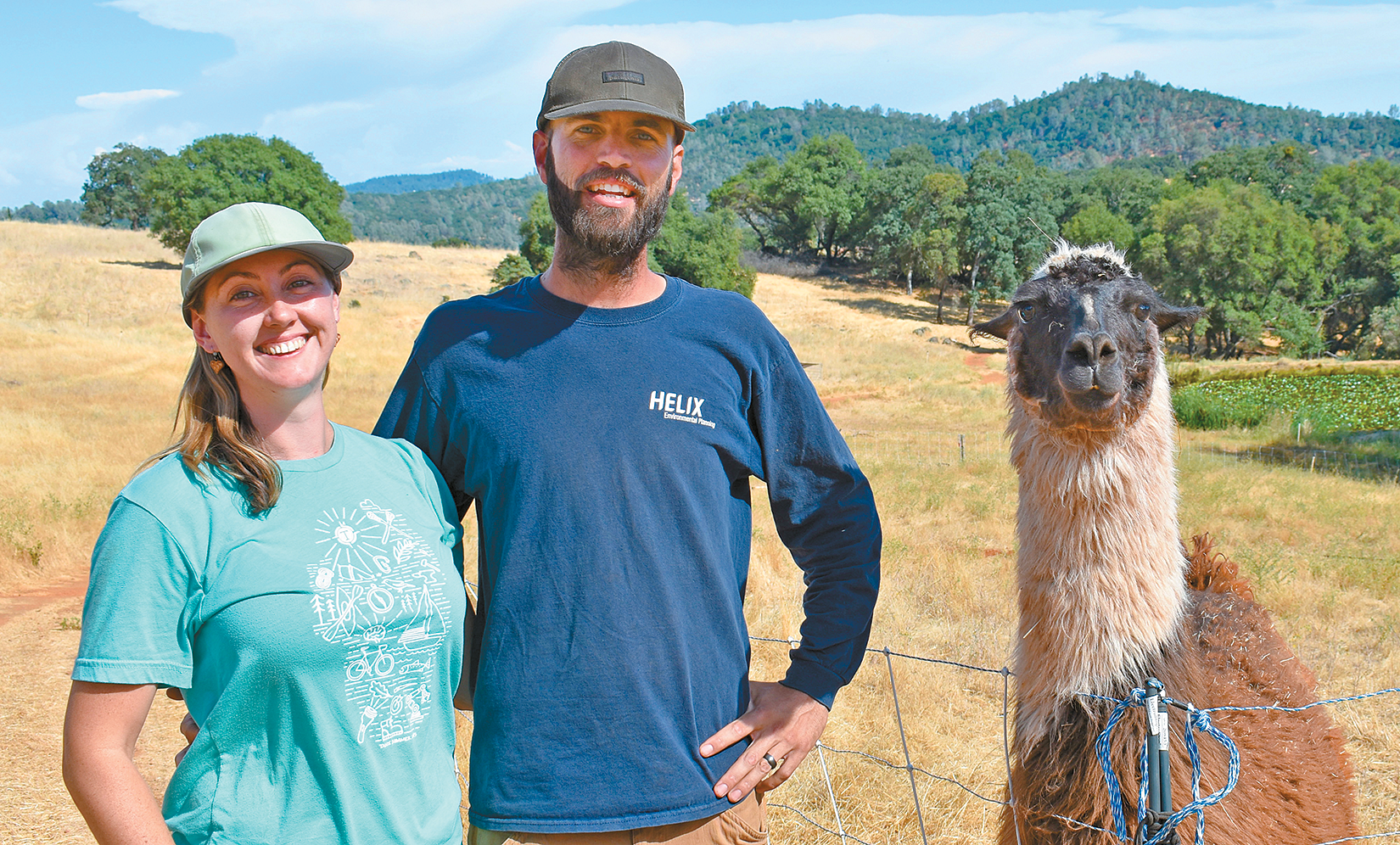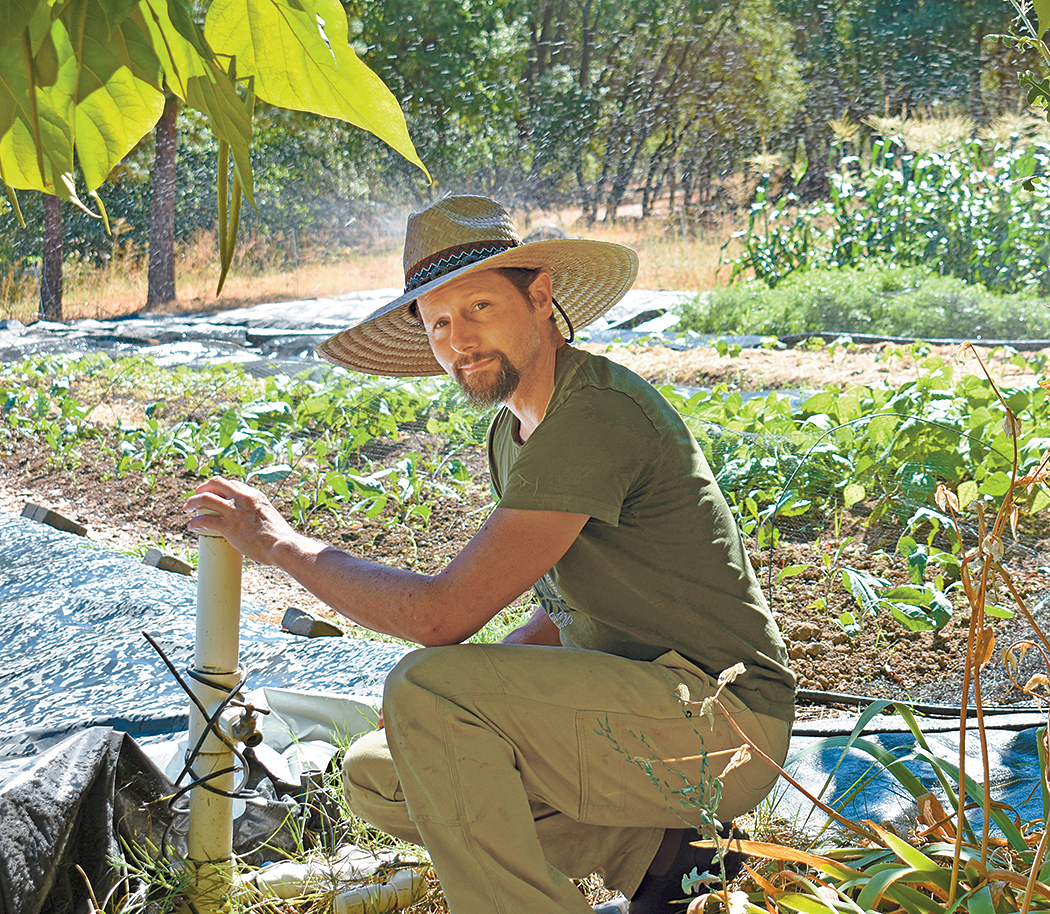Programs help new farmers find land, secure leases
.png)
Photo/John Watson

Photo/John Watson

Photo/John Watson
By John Watson
New farmers Aaron and Mira Brinkman have reason to feel lucky. Their second year of raising a small herd of Katahdin and Dorper sheep on a leased 30-acre spread in southern Nevada County is going smoothly. They say their relationship with the landowner could not be more collaborative.
But their successful ascent into farming wasn’t due to luck. The Brinkmans, who operate Brinkman Family Ranching, are among farmers across the state who have benefited in recent years from statewide and regional programs designed to match them with landowners and to assist with crafting customized lease contracts.
Through its Agreement-Building Services Program, Aptos-based California FarmLink provided the Brinkmans and their landowner with online tools for creating a finely honed contract.
The Brinkmans and the property owner connected through Nevada City-based Sierra Harvest Land Match Program, which mirrors California FarmLink’s similar Land Access Program. Land Match puts farmers in touch with landowners who are interested in having a farmer rent, lease or buy their land.
The Land Match and Land Access programs and others like them play a key role in matching landhowners and farmers across the state, using online portals describing property attributes on the one side and farmer needs on the other.
Often, both parties post simultaneously to California FarmLink’s portal for statewide outreach and to Sierra Harvest’s portal to tag up with a more regional Sierra foothills audience.
California FarmLink, started in 1999 as a small nonprofit with just two staff members and now employs more than 30, offers financing, business education and support for owning or managing agricultural land.
In addition to a program of loans for agricultural and fishing businesses, California FarmLink’s Land Access Program serves as a bilingual English-Spanish tool to connect people, facilitate access to land and provide a gateway for getting assistance with land leases and other agreements.
Online tools of the organization’s Agreement-Building Services Program are available to the general public. California FarmLink provides resources and staff assistance to help farmers, ranchers and landowners build agreements related to land tenure, grazing contracts and the sale of businesses for agriculture.
“Over the years, we’ve observed that the more specific the agreement, the better the chance of success over the long term,” said Gary Peterson, California FarmLink’s director of communications and philanthropy.
Peterson said FarmLink received assistance from the Stanford Law School in creating a library of lease clauses that can address routine and obscure issues farmers, ranchers and landowners may face.
For their own lease contract, the Brinkmans cherry-picked clauses from those online resources. They said they were pleased with the results.
“Clean lease contracts go a long way to keeping relationships healthy and even-handed over the long term,” said Aaron Brinkman, who with Mira lives on the property that is leased for sheep raising. The owner’s house is yards away on the site.
“Soon after moving in, all of us decided to meet once a month to discuss any and all issues,” Aaron Brinkman said. “Those meetings have been extremely helpful.”
Sierra Harvest Farm Institute Director Amanda Hixson, who oversees her organization’s Land Match Program, said she welcomes the partnership with California FarmLink’s Agreement-Building Services Program.
“Whenever we have a successful match, I always connect our farmers with California FarmLink, because they’re so experienced in writing leases that are really fair for both the farmer and landholder,” she said. “They’re the experts.”
Sierra Harvest works with school children, farmers and community members throughout western Nevada County to provide farm-to-school education, support farmers in growing food in regenerative ways and create equitable access to local foods.
The Land Match Program helped Rob and Sarah McKay, who purchased 10 acres of Nevada City pasture and land for growing vegetables, owner-financed at what they said was a reasonable price.
Their match-up with the seller was the result of Sarah’s time spent perusing the Land Match portal. That was followed by in-person visits to the property and developing a relationship with the seller.
Now, following Rob McKay’s apprenticeships, farming opportunities and participation in Sierra Harvest agricultural classes, the couple is well into their first year as farmer-owners.
Advocates of regenerative farming involving building topsoil and sequestering carbon, the McKays are doing rotational grazing with their small herd of Katahdin sheep, plus regular rotations of their turkeys, broiler chickens and layer chickens.
At their Heart and Soil Farmstead, the couple harvests more than a dozen vegetable crops throughout the year and sells to a local arts school and to neighbors.
Rob McKay said the Land Match and Land Access programs create connections among different agricultural generations to help farming and ranching continue to thrive.
“California is filled with older landholders who are in debt on the one side and younger farmers who don’t have capital on the other,” he said. “These programs bring them together and help both parties create reasonable leases, ultimately to everyone’s benefit.”
(John Watson is a reporter in Nevada County. He may be contacted at john.watson@comcast.net)




